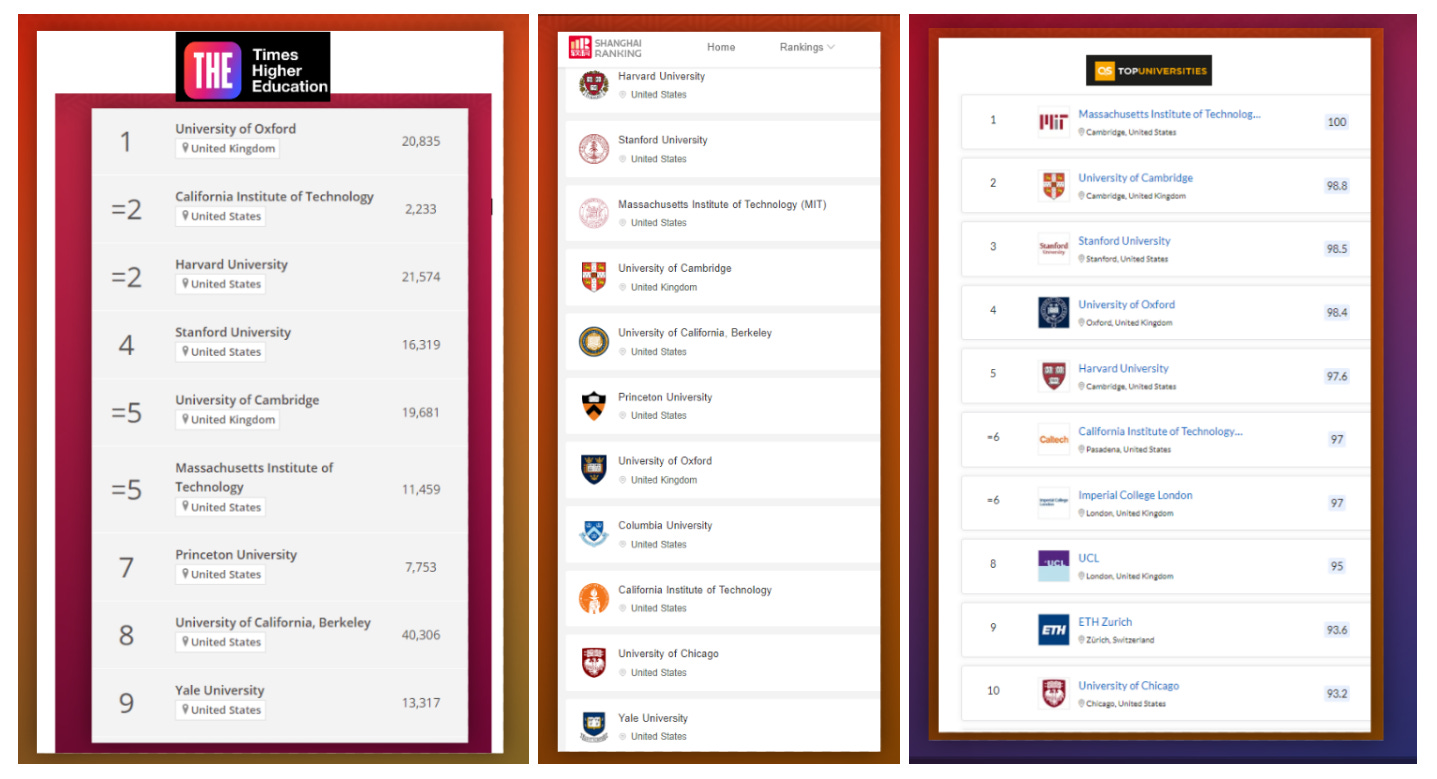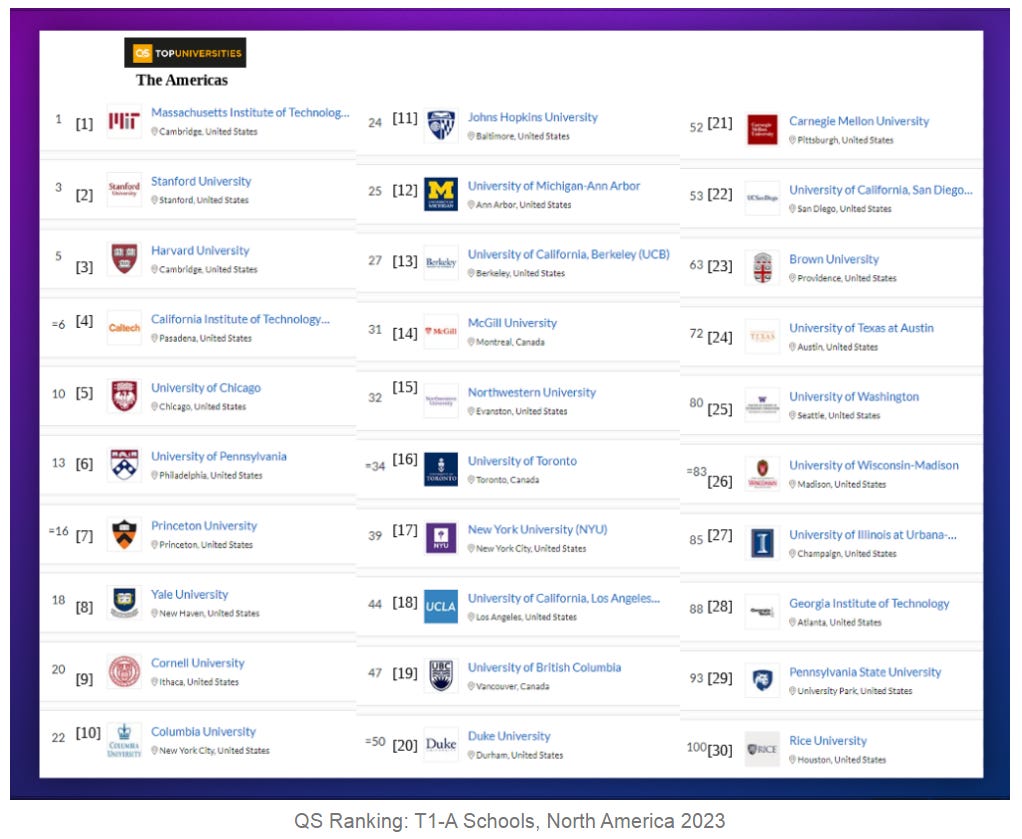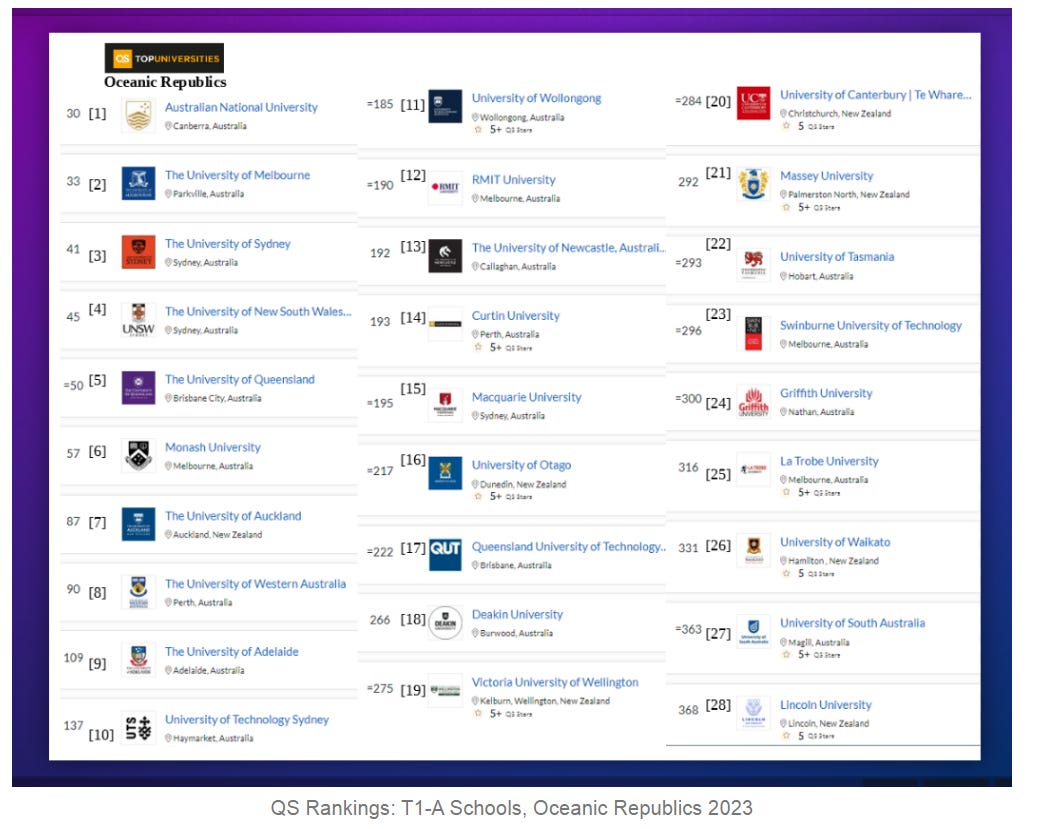University rankings are a farce. One that considers many items which are of no real interest or benefit to you: the prospective student. There is how much money is around; how many grants are brought in; campus life markers; how many papers are published; how many tennis courts; how many lakes; how many shootings; is there often a line at the golf course and people who refuse to play through; do all the buildings have windows to see outside; how much is currently disputed territory and/or gangland of some variety; which school has the most drunks; which faculty has the fewest drunks; who wore it best; who has the best hair; and on and on. That is what make up these rankings. Even pretending they are conflict of interest free (they are not), those are not the metrics everyone cares about.
•
How about how close it is to your house, and is it subsidized by your state, for example. Does excellence in research output matter, if you are going there to learn fundamentals and their teaching drunks lack in excellence? Greek life! If there is no bar on campus, is there a frat district, or equivalent, which is not overly policed? University of California (Santa Barbara) consistently ranks as the number one party school in America (as it has again in 2023), while also still being a high tier “West Coast Public Ivy” out ranking the likes of Dartmouth, Vanderbilt, Texas A&M, Emory, Maryland, ASU, UVA, McMaster, UMass (Amherst), Tufts, Rutgers and Georgetown, among others, in academics. You can have it all! This is something worth considering. Similarly, is there a student union culture? Are associations/societies encouraged and supported by the school and faculty, with access to rooms, and ideally some funding? Where has the better protests? Find out.
UCSB ranks as the number 1 party school in America, while still maintaining a high tier academic rank as a “West Coast Public Ivy League” school. In truth, all universities are pretty much the same in the first 3 tiers (top 300 places). Even T4/5 are all mostly fine. You do not begin to get “Trump University”, or things named after Saudi princes, even though you live in Kentucky, until at least tier 6. Plus the world is big! Even the top 500 is possibly a little non-representative. None the less, decisions do need to be made. And that requires a metric. As a rule of thumb: If you have seen it in a movie, it is good. Irrespective of what that film was about. Next, the elite public schools (or the “Public Ivys“, to use the archaic sporting description), are usually named after the place they are located in, and did so first! They also affiliate together. This is done in any number of ways, sometimes even as “rivalries” (cf OxBridge), the dynamic itself is not important: only the grouping. The “Ivy league”, for example, was a sporting nonsense. Australia’s top ranked schools formed the “Group of the Eight Elites” (Go8). The UK has the Russell Group (named after the hotel, in which the original evil dudes thought it up, as is tradition.) There are the Maples of Canada, and the UResearch15. Indeed, every school and school system forms one (or more) of these such groups. If your school has not, then why not?
And, not to appeal to the “OxBridge” shared history of the modern university systems, but age does matter. Age of the school matters, even in places where the oldest schools are all “sandstone” or “redbrick” institutions. This is as ‘money makes money’, and endowments from longer ago have more money now. This is in addition to more alumni of the school out in the world. Alumni with money, and time, to donate. And then money again. More alumni generally means there are more persons, friendly to the school, who serve in positions of power at every level within the greater community as well. All benefits.
Beyond that, sure, you want to be in the first 300 (a tier3/T3school) at a minimum. Usually. And if you want access to any amenities; speakers coming through town; any money for campus life; a color scheme and seal/logo that someone put some thought, time and pride into generating: Maybe even T2 or higher should be the aim. Of course, the instinct is to think “surely the higher the tier the better?”, but not so fast! Ideally this should be the aim for most people, when speaking in generalities, with no other information. Indeed, though no one applies to just one school, some decisions do have to be made from this place of quasi ignorance. However, this is your life, your youth and (in may ways) your future. So, it is of benefit to seek as much information as possible and to personalize! When looking at schools, see if they are a match for you, or at least who you think you are. Take a mean of all the main rankings (QS, Times, Shanghai ect), absolutely. As a place to start. Then interrogate those data! Seek qualitative opinions of those who have gone before. What is hidden in the rankings? Is your school of choice leading in any sub-rankings? If a smaller school, did they bother to specialize anywhere? Are they smart enough to run their own “independent university ranking” company, if they are not ‘classically competitive’? This is about the culture of the school. And it matters. Being paired with a famous lab, or well branded school, is not nothing, career wise. It is not everything, however. And it is most certainly over-sold, on just how “something” it is. Life will happen either way. You best try and match to your “selfness”, as best you understand it, to your environment as early in your career as you can.
Especially for undergraduate, this is a time of exploring. Clichés like “finding oneself”, and all that nonsense, is not all nonsense. A good liberal arts degree, with 2 years of taking any class that commands your interest (whose wait-list and prerequisites you can get through: and auditing where you can not) and two years of specialty focus, is arguably the best education format. Everyone knows it. What one never knows, is the path to success. “Streamlining” programs, for some imagined career you do not truly understand, is nearly always a mistake. Never be in a hurry to graduate! That does not mean throw pragmatics to the wind. It just means practice self honesty.
•
If an athlete, scholarships and sports equipment may actually matter for your experience. If you have pretenses towards being a physician, you won’t (most likely, idiot) but either way, then a medical school and your university having affiliation with hospitals may be of benefit. You are going to want to check that. Should you desire the academy as an aesthetic (because that is all it is to you at this point, let’s be honest), then what are the relationships with other schools and institutes? Are they known for particular ‘schools of thought’? How much grant money do they bring in? Those things do then become more relevant.
•
If a grad student, then research output may matter after all! Do they have awards, even if they made them up and then gave them to themselves? All awards are made up and given to each other. More importantly, do they manage to graduate many PhDs? Do their supervisors get their students’ names on at least one paper before graduation, come hell or high-water? Alternatively, if you are not just joining someone else’s lab, to have your ‘original contribution’ be doing whatever they are doing or just taking the path of least resistance towards whatever grants/identity are easiest to latch onto in this moment: Is there someone who will supervise your insane, interesting but half baked, dissertation research concept? And do so in a way that you have a chance of defending it, and actually graduating? (Sometimes the only person alive who ever covered something similar to you is at one of these smaller, private, schools. You best consider that, and find them!). Also, if spending nearly all of your time writing and reading at a computer for a few years – perhaps campus life (or at least night life) is less critical in your case. May even be a detriment! Be honest.
•
Alternatively, if you barely scratched by in high-school, but your parents expect you to waste your time in a worthless degree (eg Bus/Law, with no intention to practice), perhaps a party school, but with a better general reputation to hide behind, would be the more beneficial choice. Even if it cost a little more and you have to move states.
•
Do you want to travel? What kind of schools to they have exchanges with? It is *ALL* education, what is being described here. Not just the output of standardized tests, trying to limit life choices to how you do on one exam, one day. Or which parties you missed the night before, for said exam. You don’t know that was the right choice! Reflect on what the ranks may be missing. And start a podcast about it! (nb You must start at least two podcasts, prior to application, to even be considered for entry at most T2-B schools and higher.)
•
Really, all of these designations are arbitrary. Dividing into tiers of 100, based on criteria all invented by these schools, is fraught because there is only one thing they all have in common: Selling “educational-brands” as a product first, and maybe education itself second. The competition adds _some_ credence. And frankly, the short hand is helpful. Divide into groups of ~100 is fine. And further divide those into thirds of “A”, “B” and “C”, with borderline cases given the benefit of the doubt (because the rankings are so arbitrary on so many metrics. And, though not discussed here, T1-A schools have their own set of unique problems. There is no “right” answer.) And never forget to look at the sub-specialty and regional ranks, which your school will conveniently highlight for you (if they do not even do that…um, OK, that is a bad sign. Unless it is a branding choice in itself.) Still, it is all a nice “at a glance” system. And something for people, who do not watch sports, to enjoy each year.
•
Just remember to personalize. No matter what stage of your career you are in. We don’t all need buildings with windows that allow in natural light. And do try new things (at all stages of life, but in this case referring to a more liberal education, for those starting out in particular.) Because whatever it is you think you are going to do with your life is wrong. You are 100% wrong. In fact, you do not even like that thing! Which is what university can _really_ teach you. If you are willing to work hard, and are a little lucky. And don’t mind dying in debt (though sometimes with a decent job. So, there is that.)
•
Happy rankings/acceptance day! (PS: consider the weather.)
•
-JC
•> Bio-Ethicist (Medicine)
•> Pharmaceutical and Vaccine Development (grad student), at an undisclosed Tier 1 institution, with a decent party district.











